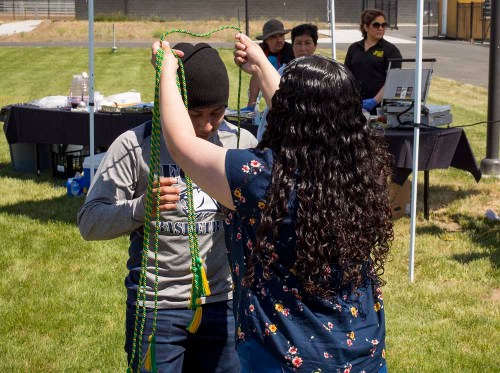IMESD’s Migrant Education Program celebrates graduating seniors
Published 12:00 pm Monday, May 17, 2021

- Miguel Ramos-Avelino receives a set of graduation honor cords during the IMESD’s Migrant Education Program graduation ceremony at the Eastern Oregon Trade and Event Center in Hermiston on Saturday, May 15, 2021.
HERMISTON — The sound of music spread across the lawn at the Eastern Oregon Trade and Event Center, as students in the InterMountain Education Service District’s Migrant Education Program celebrated graduation on Saturday, May 15, in Hermiston.
The event, in its second year, offered recognition to graduating high school seniors, preschool students entering kindergarten and their families, according to the IMESD’s Director of Migratory Education and Assessment Eric Volger.
Trending
“It’s just to give a little bit of extra recognition for some of the challenges that are faced when being mobile,” he said. “Many of these students transfer multiple times in their school career so picking up in a different school, trying to catch up — much less graduate — is a pretty awesome accomplishment.”
As Umatilla High School senior Jennifer Rincon sat with her family, she reflected on her last two years at Umatilla High School.
When Rincon and her family moved to Umatilla from Porterville, California, two years ago she didn’t know many people and was struggling to adjust to the new school. However, two years later the 18-year-old high school student is preparing to graduate high school and attend Oregon State University next year.
“When I got here, I only knew one girl from the whole school and I didn’t know anyone else,” she said. “Once I found out about the Migrant Education Program, I was more comfortable being in the school and I didn’t feel as left out.”
Rincon credits the IMESD’s Migrant Education Program, and a similar program she took part in while living in California, with her success as a student.
“It’s really opened doors for me,” she said. “It’s made me more comfortable asking for help from teachers and my counselor.”
Trending
Not only has the program inspired Rincon to talk to her teachers, but when she starts at OSU next fall she plans to study secondary education and Spanish, a decision she says was directly a result of her experience as a migrant student.
The decision to pursue education is a result of her love for children and a dream to someday be able to help migrant students in the way the program helped her.
“Even after graduating college I want to also be involved in the Migrant Program to help other students like they helped me,” she said. “They were able to help me pass my classes and motivated me to continue with my stuff.”
Through Rincon’s time in the Migrant Education Program, she worked closely with the program’s graduation specialist, Brenda Flores, who was once a member of the program herself, is a 2014 graduate of Stanfield High School and first-generation college graduate from Western Oregon University.
Flores and several other graduation specialists help to ensure that students are on track for graduation and help them prepare for life after high school, whether that be work, trade school or college. This year, the program will see 49 students graduate from high schools across Umatilla and Morrow counties, according to Flores.
“We just help our families look for resources and help our students figure out how to get on track,” she said. “A lot of our students are first generation and although they know how school works, they don’t know what they need to do to reach some of their goals.”
This year, Migrant Education Program staff have been working especially hard to navigate the changing educational landscape as a result of COVID-19 and ensure students from preschool through high school have access to the tools and resources they need.
“With COVID it has been really hard because a lot of our families didn’t have Wi-Fi at home or didn’t have computers or they had a shared computer,” Flores said.
Flores, and parent involvement specialist Obdulia Munoz, have seen an uptick in the involvement in students’ home lives over the past year, as they work to ensure families have the tools they need to navigate remote learning and other COVID-19 issues.
“Instead of just having the parent meetings that we usually have during the regular school year, we try to meet physical needs like food and rent and emotional support with parents,” Munoz said.
Munoz said she works with outside organizations to try and get families the support they may need and ensure students are able to continue to thrive in the school system. According to Munoz, the Migrant Education Program serves roughly 700 families from preschool through high school, as well as out-of-school students who are working and pursuing a GED, English language classes or other additional education.
”What I’m trying to bring with my students is just showing them that they’re not alone and provide them that support that I would have wanted,” Flores said.









